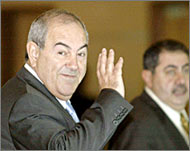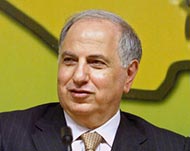Allawi: Ex-Baathist exile turned PM
Once a close aide to Saddam Hussein but now a favourite of the CIA, Iyad Allawi has become the new power broker in Iraq – with some other powerful backers hoping to keep him there.

Named as Prime Minister designate by the US-appointed Iraqi Governing Council on Friday, Allawi has been quietly pushing his way through Washington’s political backdoors, gaining much influence along the way.
It is an achievement that took many months and a lot of financial backing to secure.
In January, the Associated Press (AP) reported Allawi had been paying prominent Washington lobbyists and New York publicists more than $300,000 to help him contact policy-makers and journalists.
According to papers filed with the Justice Department, all the money had come from UK citizen Mishal Nawab, described as Allawi’s close friend and admirer.
‘Importance of lobbying’
Nick Theros, an advisor to Allawi, told AP in January Allawi recognised the importance of conveying his message to US leaders, especially while they remain the occupying power in Iraq.
“It’s not enough to just work behind closed doors in Baghdad,” he said. Theros described the money spent by Allawi for lobbyists as, “the going rate here in Washington”.
|
“Iraqis are asking who is Allawi, and is he just another one of these keen exiles coming back to Iraq for his own interests?” Dr Fawaz Girgis, Professor, |
“It doesn’t really happen for less,” he said.
Some analysts argued Allawi’s publicity and lobbying campaign might have been encouraged as a counterweight to the now disgraced Ahmad Chalabi.
But Theros rejected those suggestions. “There is no official support of any sort, not in any areas of the US government,” he added.
Nevertheless, there are striking similarities in how Chalabi and Allawi both paid vast sums of money to lobbyists and publicists in Washington.
Like Chalabi, Allawi too was appointed to the Governing Council. He has been responsible for overseeing the council’s security committee.
Despite the similarities, however, Allawi and Chalabi differed on a number of issues – namely the de-Baathification programme. Allawi became more vocal with his criticism of Washington’s purging of Baathists from positions in an editorial in the Washington Post last December.
A former Baathist
Born in 1945 to a prominent Shia family, Allawi trained as a neurologist and joined the Baath Party in the 1961. But he went into exile after a falling out with Saddam Hussein in the early 1970s.
 |
|
He survived an attempt on his |
In 1978, Allawi survived an attempt on his life in London. The attack was believed to have been ordered by Saddam Hussein, but no evidence has emerged to support this claim.
He formed the Iraqi National Accord (INA) in 1991 with the backing of the CIA and the UK’s MI6. The party became known for attracting disillusioned former Baathists who wanted to orchestrate a coup from within the Iraqi army.
But the INA will likely be most remembered in Britain for passing on to MI6 a report from an Iraqi officer who made the now-infamous claim that Saddam could launch weapons of mass destruction within 45 minutes.
The London-based The Times quoted an Allawi spokesperson in New York who asserted in January 2004 that the 45-minute claim was essentially a “crock of s**t” indicating that the claim was indeed defunct and baseless.
Credibility problem
Allawi’s credibility may continue to be an issue, say analysts, as Iraqis have become weary of exiles who are jockeying for power in the new Iraq.
“The big question is how do Iraqis see Allawi?” says Dr Fawaz Girgis, a political science professor at Sarah Lawrence University and senior analyst with ABC News.
“Iraqis are asking who is Allawi, and is he just another one of these keen exiles coming back to Iraq for his own interests?” Girgis told Aljazeera.net.
|
“The appointment of Iyad Allawi is a continuation of US plans to appoint only those connected to the US strategy in Iraq” Mustafa Bakri, Editor,Al-Osboa newspaper |
Mustafa Bakri, editor of al-Osboa newspaper (The Week) was more critical of Allawi’s appointment and the Iraqi’s ties with the CIA.
“This is not a transfer of sovereignty, but a change in the faces chosen by Paul Bremer. The Iraqi people are more than capable of resisting this agenda,” he said.
Bakri told Aljazeera.net Allawi’s appointment would further marginalise Iraqi voices within the country and lead to more frustration and anger, thereby making the resistance, “a legitimate alternative.”
‘Good qualities’
But Leith Kuba, an independent Iraqi politician residing in Washington DC downplayed Allawi’s strong links to the CIA and praised what he called, “Allawi’s good qualities.”
“His links with the CIA could have been a critical factor for Iraqis 10 years ago, but not anymore,” Kuba told Aljazeera.net in a telephone interview.
“He does not have an ethnic or dividing agenda. Allawi has long had a nationalistic Iraqi agenda, and the country is in need of his agenda,” he added.
 |
|
Ahmad Chalabi disagreed with |
If Allawi is to succeed, however, he will have to find ways to appease the varying political forces in Iraq, not to mention the relentless criticism levelled against him from diverse groups of Iraqis.
Dr Haifa al-Azawi, a California-based gyneacologist and US citizen who went to school with Allawi, wrote a column on 12 February in the London-based al-Arab newspaper in which she questioned Allawi’s moral authority as an Iraqi leader.
“The Baath party union leader, who carried a gun on his belt and frequently brandished it terrorising the medical students, was a poor student and chose to spend his time standing in the school courtyard or chasing female students to their homes,” she wrote.
According to al-Azawi, while in England studying, Allawi ” spent his time dealing with assassins, doing the dirty work for the Iraqi government, until his time was up and he became their target.”
But scepticism over Allawi permeates throughout the Arab world as much of the public feels that he has been handpicked to lead Iraq, according to Washington’s rules.
“The appointment of Iyad Allawi is a continuation of US plans to appoint only those connected to the US strategy in Iraq,” said al-Osboa’s Bakri.
“This reveals the untruths of what the Bush administration says about wanting to implement full democracy in Iraq,” Bakri added.